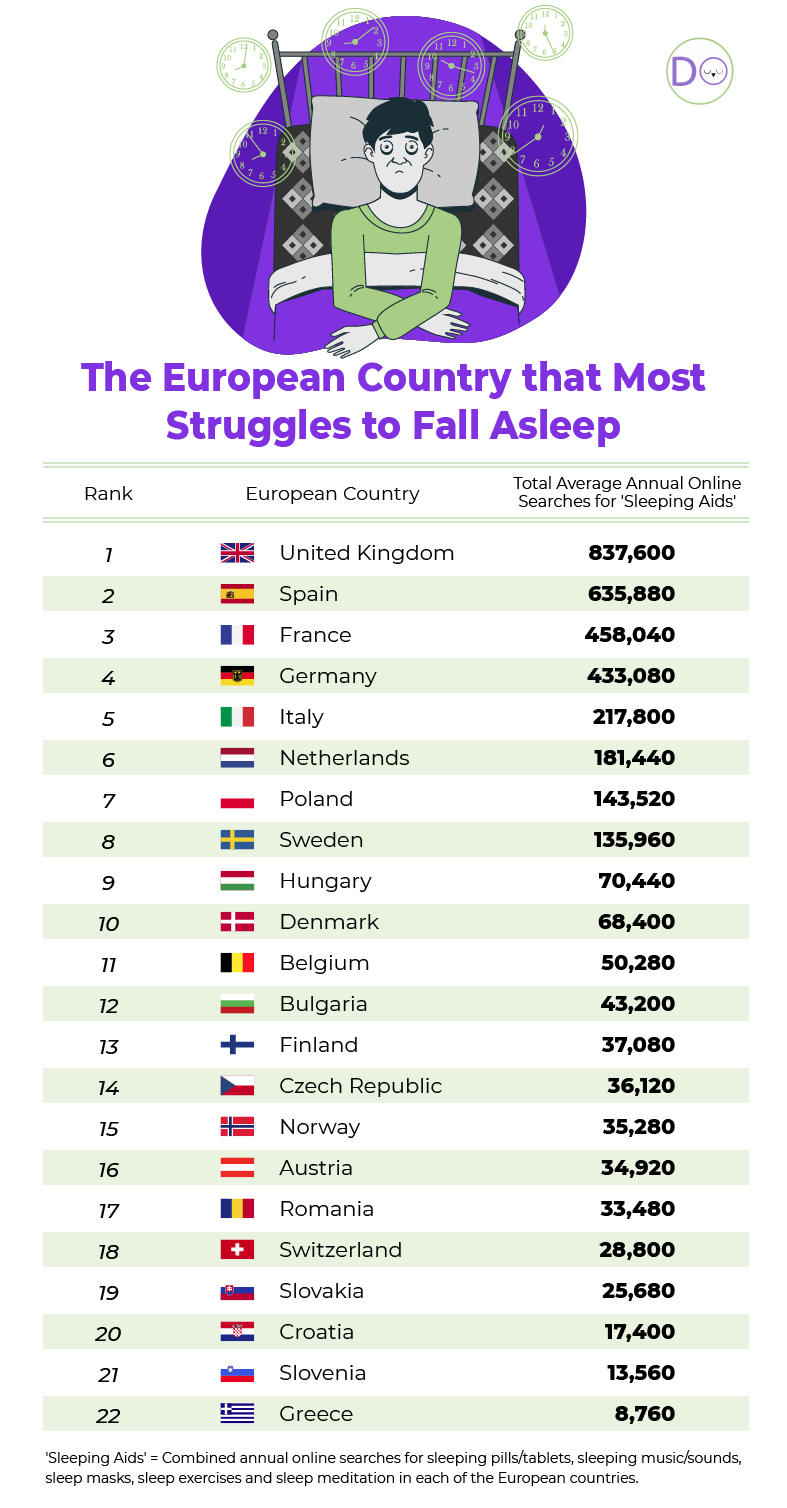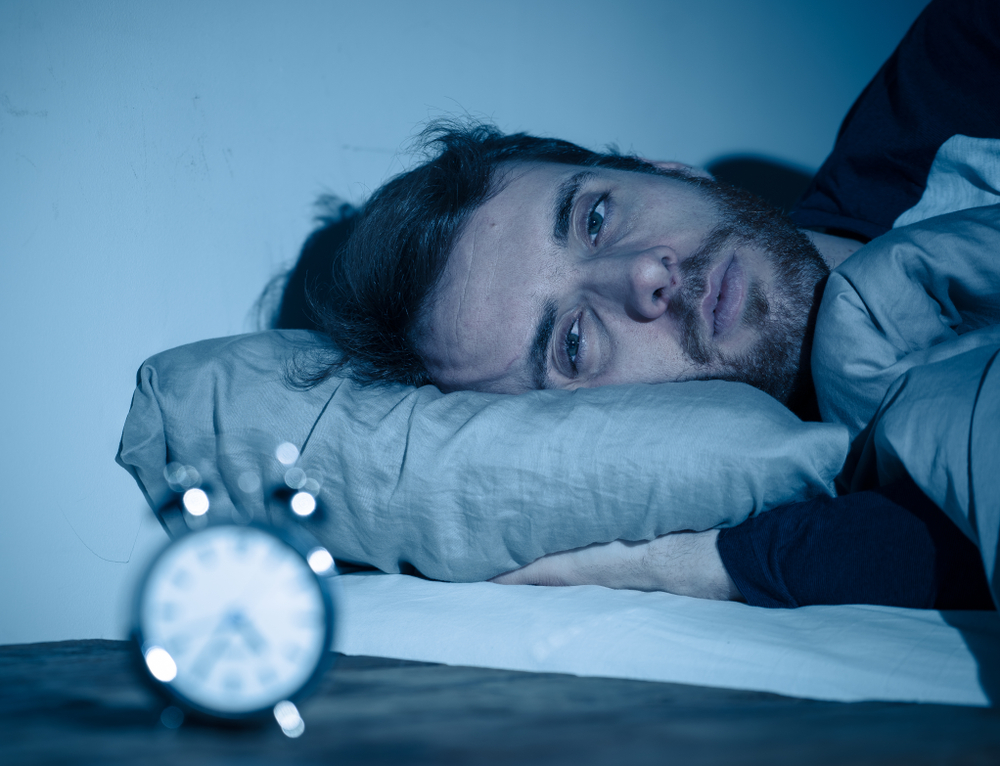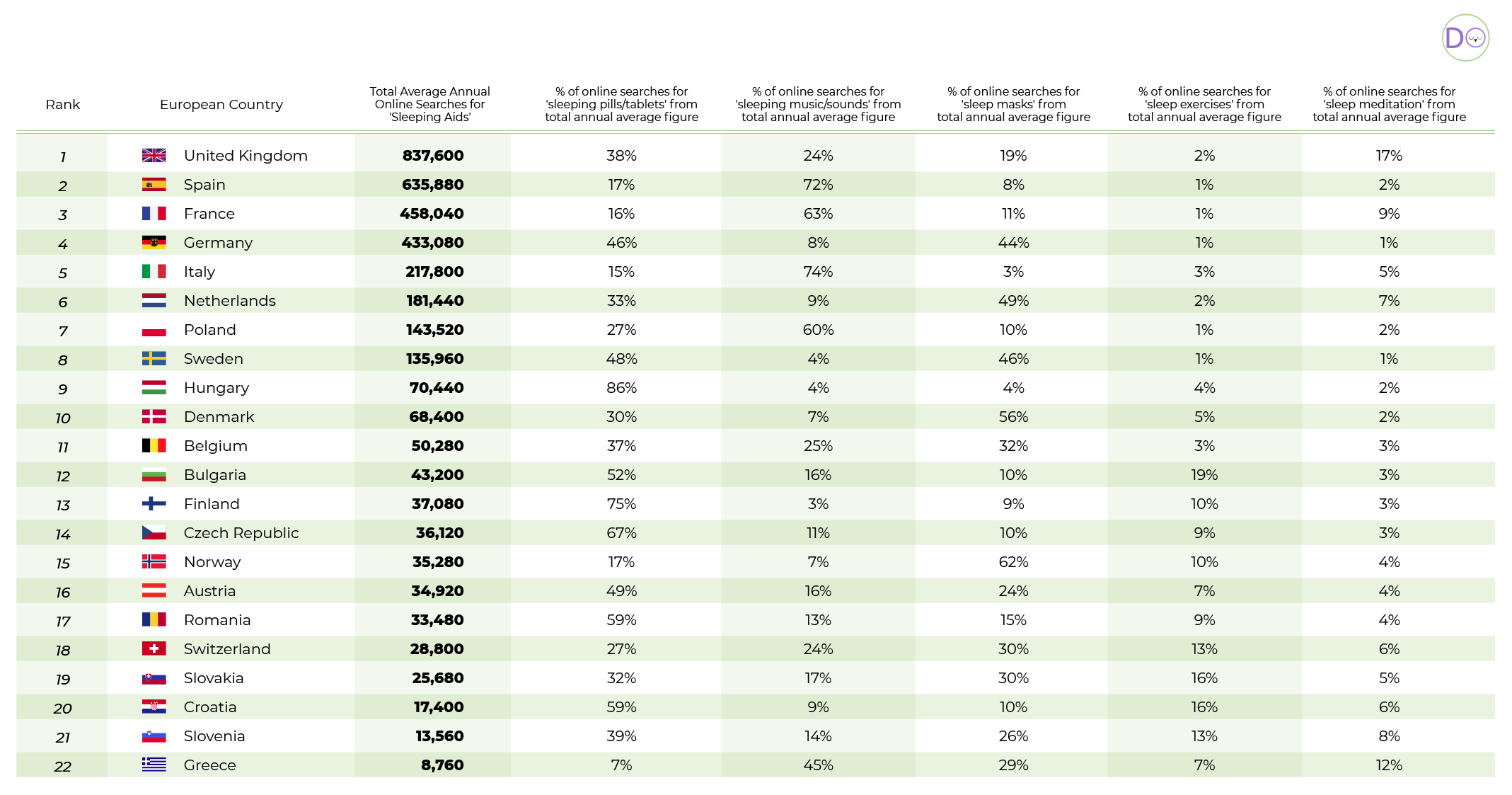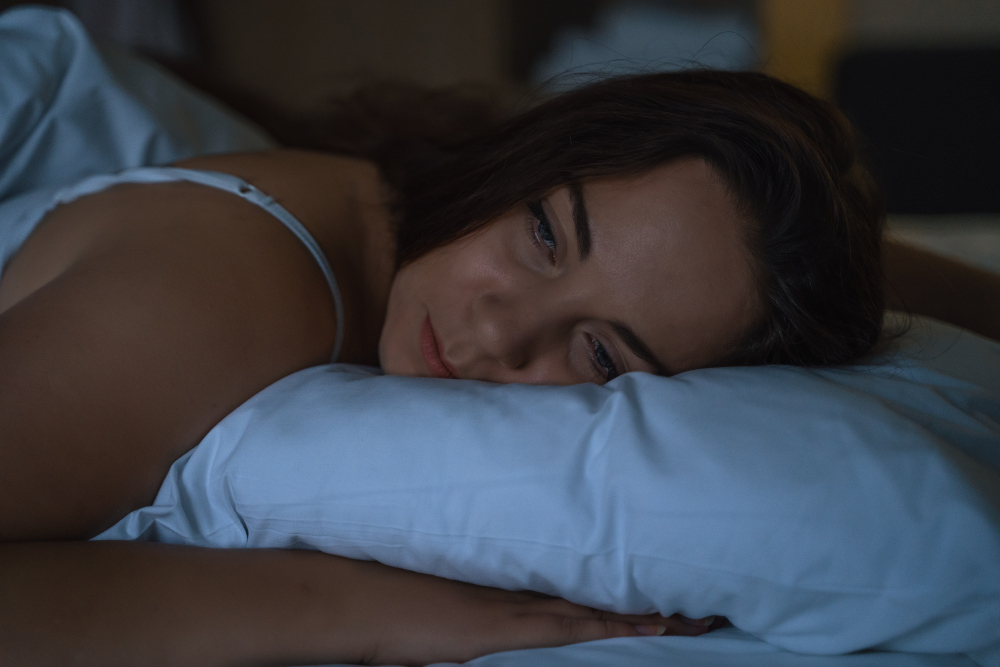Sleep is a fundamental aspect of mental and physical wellbeing, yet many of us struggle with it. A lack of sleep can result in a number of negative consequences, including high blood pressure, weight gain, higher risk of diabetes, and memory issues. So, it is clear that sleep is imperative and should be a high priority for all of us.
Interested in exploring different sleeping habits, TheDozyOwl.co.uk utilised analytics tool Ahrefs to establish which European country most struggles to fall asleep based on online searches for various
sleeping aids.
European Countries Struggling With Sleep
Our research found that the UK struggles to sleep the most, as Brits make an average of 837,600 online searches each year for sleeping aids – equivalent of 2,295 searches each day. Of these searches, 38% are made for sleeping pills or tablets, 24% for music or sounds, 19% for sleep masks, 17% for sleep meditation, and 2% for sleep exercises.
Spain ranks in second with 635,880 online searches on average each year relating to sleeping aids. When analysing Google searches, queries are predominantly made up of sleeping music/sounds to help Spaniards fall asleep (72%). A further 17% of searches are made for sleeping pills/tablets, 8% for sleep masks, 2% for sleep meditation, and 1% for sleep exercises.
France comes in third, as residents make an average of 458,040 online sleeping aid searches per year. Out of these searches, 63% were looking for music or sounds to help them sleep, 16% for sleeping pills and tablets, 11% for sleep masks, 9% for sleep meditation, and 1% for helpful sleeping exercises.
Image Credit: Sam Wordley / Shutterstock
Germany (433,080) and Italy (217,800) are among the other countries where there are more than 200,000 online searches per year for sleeping aids, respectively ranking fourth and fifth.
From sixth to eighth, there are over 100,000 online queries a year for sleeping aids in the Netherlands (181,440), Poland (143,520) and Sweden (135,960).
At the other end of the rankings is Greece in 22 nd position. There are as few as 8,760 online searches a year from restless Greeks looking for solutions to help them get some much-needed shut-eye. From the 8,760 online searches, 45% are looking for soothing sounds, 29% for comfortable sleep masks, 12% for sleep meditation, 7% for sleeping tablets, and 7% for useful sleep exercises.
A breakdown of the findings
Interestingly, in 13 of the 22 analysed European countries, the highest proportion of online searches in relation to sleeping aids were for sleeping pills and tablets. These countries are the UK, Germany, Sweden, Hungary, Belgium, Bulgaria, Finland, Czech Republic, Austria, Romania, Slovakia, Croatia, and Slovenia.
In five of the remaining nine European countries, the highest proportion of online searches in relation to sleeping aids were for sleeping music or sounds. These countries are Spain, France, Italy, Poland, and Greece.
In the four remaining European countries, the highest proportion of online searches in relation to sleeping aids were for eye masks for sleeping. These countries are the Netherlands, Denmark, Norway, and Switzerland.
Image Credit: DedMityay / Shutterstock
TheDozyOwl’s top tips to achieve better sleep in 2021:
1. Establish a sleep routine
Getting up and going to bed at the same times every day will enable your mind and body to get used to a set sleep routine. Keep this sleep routine consistent as possible and try not to slack off on weekends when possible.
2. Reduce light intake
Artificial lighting can have a negative impact on your ability to sleep as it tricks your brain into thinking it’s daylight. To avoid this, try not to use your smartphone or tablet for at least half an hour before going to bed. By not exposing yourself to the blue light these electronic devices emit, you will feel more ready for sleep.
3. Implement relaxation techniques
Indulging in a relaxing activity or two (other than staring at your TV or scrolling through your phone) before going to bed can put you in a much better mood to sleep. These techniques could include having a warm bath, listening to relaxing music, meditating, or reading a book.
4. Limit caffeine and sugar in diet
During evenings, cut down on your caffeine intake of warm coffee or fizzy energy drinks. It’s important to do so as caffeine is often attributed to deterring a state of deep sleep. The same goes for sugar, resist sweet temptations such as chocolates and cake at night as the energy spike and then subsequent crash from these sugar-packed treats can play havoc with your body clock.
5. Invest in a quality mattress
A quality memory mattress or foam mattress plays a vital and understated role in achieving good night’s sleep. Be sure to invest in a mattress that is not only comfortable to sleep on, but has the capabilities to provide your spine with adequate support to avoid any aches and pains.
Try avoiding mattresses which feel too firm on your back, and make an effort to discover the right number of pillows that works for you for optimal comfort for your head.
6. Be cautious with naps
Napping can be a great way to make up for lost sleep but it’s important to take caution with naps. You don’t want to nap for too long or too late in the day, as it can cause severe disruption your sleep routine. If you do want to nap, limit naps to 30 minutes max in the early afternoon.
7. Embrace exercise
Regular exercise can help with sleep as it is a proven way to alleviate anxiety and stress. Where possible, try to avoid exercising at least two hours before you go to sleep as people often find that exercise too close to bedtime makes it difficult for them to sleep. If you can only fit exercise in your schedule right before bed, then attempt a light rather than vigorous routine.
8. The right fluid intake
Don’t drink so much fluid leading up to your bedtime that you will need to get up at night to go to the toilet. Likewise, don’t drink too little fluid in the eventing that you will wake up thirsty at night. Try find the right balance with fluid intake.
Methodology for research:
Using online analytics tool Ahrefs, TheDozyOwl identified the top online searches in relation to ‘sleeping aids’, which were sleeping pills/tablets, sleeping music/sounds, sleep masks, sleep exercises and sleep meditation.
Each of these key words were then inserted in English as well as local language into the Ahrefs ‘keyword explorer’ tool to identify how many times on average per year that term is ‘Googled’ in a set European country.
Once this was done for all five terms, the search volumes for each of them were added together to show the collective annual online searches for ‘sleeping aids’ in each of the included European countries in the research.
TheDozyOwl did account for the different name variations people use to search for the same thing online, for instance with sleeping pills/tablets – TheDozyOwl researched in English and local language search volumes for ‘sleeping pills’, ‘sleeping tablets’, ‘sleep pill’, ‘sleep tablet’ and more.




Comments (0)